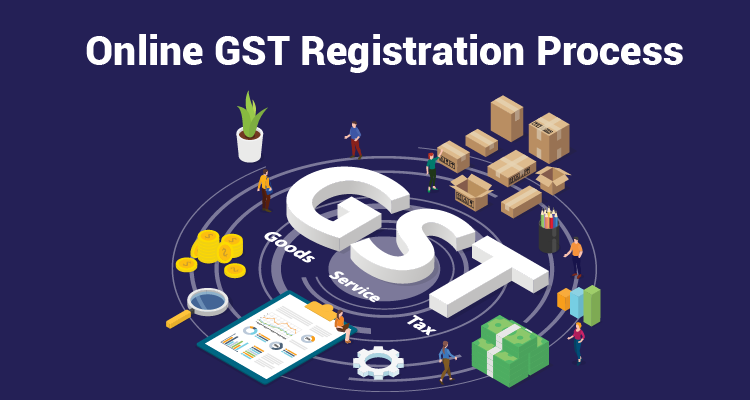Navigating the Intricacies of GST Registration: A Comprehensive Overview for Entrpreneurs
Navigating the complexities of GST registration can be an overwhelming job for many local business owner, as it includes a myriad of policies, policies, and processes that need to be abided by. With the ever-evolving landscape of tax obligation legislations, making sure compliance and understanding the details of GST registration is important for the smooth procedure of any organization. From identifying eligibility and gathering the essential paperwork to enhancing operations for optimal performance, this thorough overview aims to offer company owners with the knowledge and tools required to browse the intricacies of GST registration effectively.
Eligibility for GST Enrollment
Service proprietors need to meet details criteria to establish their qualification for GST registration. In general, services with an annual turn over exceeding a particular limit are called for to sign up for Item and Provider Tax Obligation (GST)
Furthermore, organizations that are registered under any type of previous tax obligation routine, such as VAT or service tax obligation, are normally called for to change to GST registration. By adhering to the necessary criteria, organizations can efficiently browse the intricacies of GST registration and operate legally within the tax structure.
Files Needed for Enrollment
To complete the GST registration process, companies require to gather and submit a comprehensive set of files. The crucial records required for GST enrollment usually include proof of business registration or incorporation such as the Certificate of Unification, collaboration act, or any type of various other registration certificate. Additionally, services must offer identification and address evidence of the companions or promoters, which can be in the form of Aadhar card, FRYING PAN card, key, or chauffeur's certificate. Financial papers such as bank declarations, evidence of place of service like rental agreement or electricity costs, and accredited signatory information are also essential for the enrollment process.
Moreover, specific documents associated with the nature of the organization, such as a list of goods or services supplied, HSN codes for items, and SAC codes for services, may be called for - Why choose CFO Account & Services for GST registration in Singapore. It is critical for companies to make sure that all records submitted are exact, current, and in the prescribed layout to avoid any type of delays or issues in the GST enrollment procedure
Process of GST Registration
Having set up the requisite documents, services continue to launch the GST enrollment procedure by involving with the on-line website assigned for enrollment. This on the internet site is the Product and Provider Tax Network (GSTN) portal, which serves as the main platform for all GST-related activities in India. Upon accessing the website, companies are called for to submit the GST registration type with accurate information concerning their company activities, turn over, and other pertinent info.
When the kind is finished and sent on the site, the GSTN verifies the details given by the business. The candidate may be called for to offer additional details or explanation if any inconsistencies are located. Complying with effective confirmation, a GST enrollment certification is released to the organization entity. This certification consists of a distinct Goods and Provider Tax Recognition Number page (GSTIN) that is utilized for all GST-related transactions.
It is vital for organizations to guarantee that the details given during the GST enrollment procedure is accurate and approximately day to stay clear of any type of possible issues or delays in obtaining the GST enrollment certificate.
Comprehending GST Compliance

Businesses need to be knowledgeable about the various GST conformity needs based on their turn over, nature of solutions or items, and the states in which they run. It is important to stay updated on any type of adjustments in GST legislations and laws to prevent any type of non-compliance issues.
Non-compliance with GST policies can result in significant penalties, fines, and even lawful repercussions. Organizations must spend time and resources in educating themselves and their team on GST compliance. Seeking professional assistance from tax experts or experts can also assist in browsing the intricacies of GST conformity and ensuring that organizations run within the legal structure.

Tips for Optimizing Company Procedures
For improved performance and productivity in service procedures, strategic planning and streamlined processes are necessary elements. One suggestion for maximizing business operations is to take advantage of modern technology efficiently.
Another vital facet is focusing on tasks based on their significance and due dates. By creating a clear hierarchy of jobs and establishing sensible timelines, organizations can make sure that critical activities are finished in a read review timely manner. Cultivating a culture of open interaction and collaboration among team participants can lead to enhanced efficiency and advancement.

Verdict
In final thought, browsing the complexities of GST registration calls for a clear understanding of qualification criteria, necessary files, registration processes, and compliance requirements. By adhering to these guidelines and enhancing company operations, local business owner can ensure click here to find out more smooth procedures and compliance with the GST policies. It is necessary for organizations to remain educated and updated on GST policies to avoid any fines or lawful problems.
The vital papers required for GST registration usually include proof of organization registration or incorporation such as the Certificate of Incorporation, partnership deed, or any type of other enrollment certification.Having set up the requisite paperwork, businesses proceed to start the GST enrollment procedure by engaging with the online website marked for registration. Upon accessing the website, organizations are required to fill up out the GST registration kind with exact information regarding their organization activities, turnover, and other appropriate details.
In order to preserve adherence to GST policies and stay clear of fines, businesses have to focus on understanding GST conformity. By sticking to these guidelines and enhancing service procedures, business owners can ensure smooth operations and compliance with the GST policies.